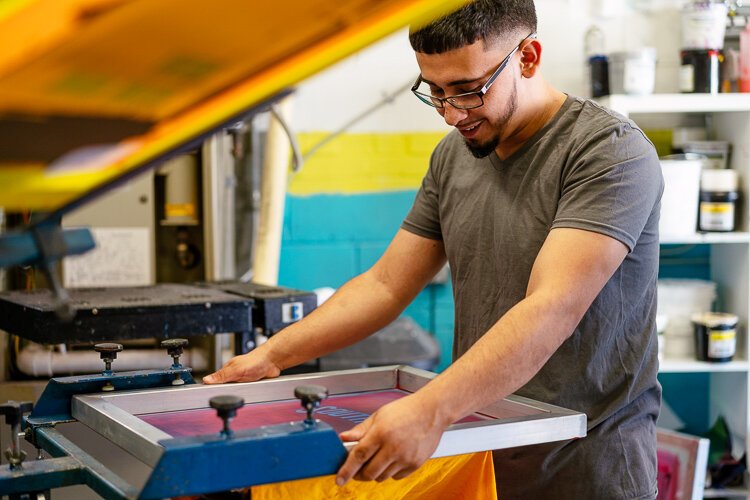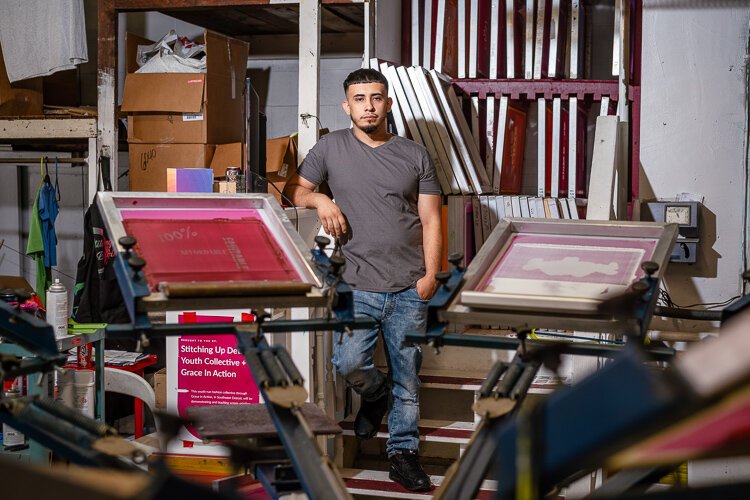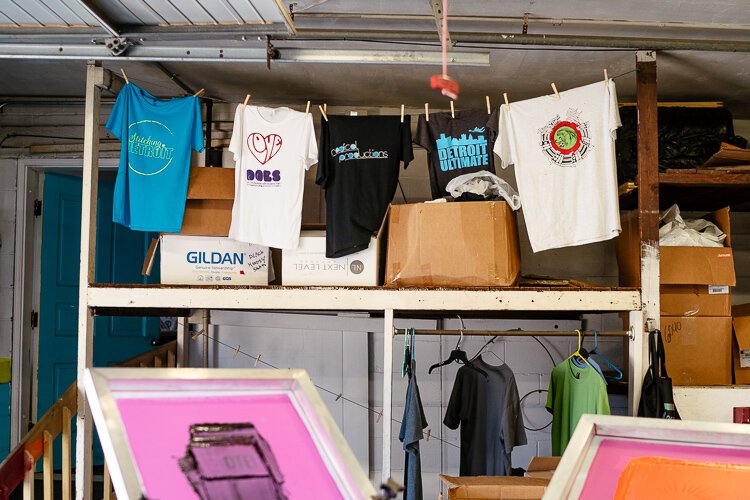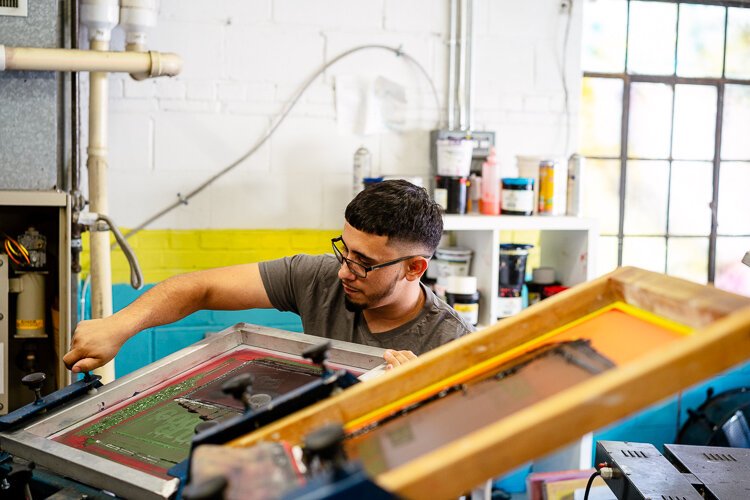Southwest Detroit native makes his mark on neighborhood with Stitching Up Detroit
Screen printing helped steer Southwest Detroit native David Camarena off the wrong path as a youth. Now he wants to do the same for others through Stitching Up Detroit.
It’s rare to discover your passion at age 12, let alone to successfully turn it into both a viable business and a training program as an adult. But that’s exactly what 21-year-old David Camarena has done since he walked into a screen-printing workshop nine years ago.
Camarena is the co-founder and lead screen printer at Stitching Up Detroit. The screen-printing business started in 2012 as a youth-run collective at Grace in Action Church and incorporated last year as a worker-owned co-op. Camarena, who was born and raised in Southwest Detroit, says screen printing changed his life in multiple ways.
“I wouldn’t say I was a perfect child growing up,” he says.
He recalls getting into a fight one day in eighth grade right before Grace in Action pastor John Cummings picked him up to take him to the church’s afterschool program.
“I really felt embarrassed,” Camarena says. “I was like, ‘What am I doing?’ Then freshman year hit and I got into some trouble there too. So I was just like, ‘I need to focus on something because it’s not good out here.'”
He found that focus at the daylong screen-printing workshop at Grace in Action’s summer camp. Camarena had always enjoyed art and drawing; the graffiti he saw frequently in his neighborhood was an early artistic inspiration for him. But the screen-printing workshop helped him identify his medium of choice.
“That first day that I did it, I was like, ‘That’s sweet,’ ” he says. “I never before knew how to make T-shirts or how T-shirts were printed.”
Camarena was immediately motivated to learn more. He asked the leader of the workshop, who owned a local print shop, if he could work for him. He says he learned the trade quickly enough that it wasn’t long before he knew how to run the shop on his own. He started thinking about how to get into the screen-printing business on his own — and the Grace in Action Collectives program provided the perfect opportunity.
The program aims to build youth-run collectives and worker-owned cooperatives that allow Southwest Detroit residents to build their own businesses, work, and create jobs in their own community. At age 14, Camarena approached Cummings and Grace in Action Collectives Director Meghan Sobocienski about starting a screen-printing collective.

“Even when he was a really young kid, he had this incredible curiosity mixed with a drive to make things happen,” Sobocienski says. “Not a lot of kids see something and want to go create it and make an entire plan for how they can create more of it. He was the kind of kid who always wanted to figure out how he could make something bigger.”
Sobocienski immediately agreed to the idea of a screen-printing collective, which she now says was “super naive” given that neither the church nor Camarena had any money or infrastructure to get it started. But the church struck a deal to trade access to some screen-printing equipment for a storefront space on Vernor Highway in Southwest Detroit, and Camarena got Stitching Up Detroit started with his friend and co-founder Pacal Zelaya. Camarena says the two worked with a mentor for about six months, but they started teaching themselves their craft from there.
“It’s just a big, long process, and there are bits and pieces in every step of the process that we had to master to make it work,” he says.
Stitching Up Detroit has worked with clients such as U.S. Rep. Rashida Tlaib, D-Detroit, and renowned Detroit muralist Freddy Diaz. After incorporating last year, the co-op is preparing to renovate the garage space it rents at Grace in Action using a grant from ArtPlace America and the Kresge Foundation.
“Their quality is so high now, their systems are so high now, I would literally put them up against any printer in the city,” Sobocienski says. “They’re really good.”
But for Camarena, Stitching Up Detroit is about more than just building a successful business. The co-op also offers a one-year training program for middle and high school students in graphic design, textile design, and screen printing.
“Our goal is that every kid that comes in gets to create their own design and print their own design,” Camarena says. “If they want to sell it, they can sell their own design.”
Camarena says there are two or three students in each class who are “100% motivated” to pursue screen-printing professionally.
“It’s a learning experience and some of them really take it in and make use out of it,” he says. “One of the kids ended up selling 50 shirts.”
Those who complete the training program can then do a summer apprenticeship with Stitching Up Detroit, after which they can apply to become a full-fledged co-op member. Sobocienski says that watching Camarena watch others learn is “beautiful.”
“As much as it is about him building a business … he is equally as interested in bringing up the next generation of young people,” she says. “It’s not just about him building an empire for himself. He is also interested in investing in young people like him and making sure they have an opportunity for their dreams to be realized.”
The mentorship-oriented approach is a big draw for some of Stitching Up Detroit’s clients. Kartav Patel is the manager of workforce education and technology at Southwest Economic Solutions, which has been using Stitching Up Detroit to print its T-shirts and sweatshirts for nearly two years. He says he appreciates Stitching Up Detroit’s high-quality work, but the co-op is doing more than just offering a service.
“I think it’s important that we continue to support young Detroit entrepreneurs just because we need to build those bridges to empower young people to gain certain skills and hold on to the things they’re passionate about,” Patel says.
For Camarena, training the next generation of screen printers seems to be about giving young people in his community a positive career path to focus on instead of the darker road that he once briefly wandered down.
“This at least opens up their minds and sends a message out that you can do whatever you want,” he says. “To be successful, you just have to put your mind to it and do the work.”
The series is supported by the New Economy Initiative, a project of the Community Foundation for Southeast Michigan that’s working to create an inclusive, innovative regional culture.







